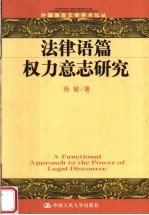

法律语篇权力意志研究PDF电子书下载
- 电子书积分:12 积分如何计算积分?
- 作 者:杨敏著(中国人民大学)
- 出 版 社:北京:中国人民大学出版社
- 出版年份:2007
- ISBN:9787300084015
- 页数:303 页
Chapter One Introduction 1
1.1 Rationale of the Study 1
1.1.1 An Urgent Need for Discourse Analysis 1
1.1.2 The Importance of Legal Discourse 2
1.1.3 A Need for Research of Legislative Discourse 5
1.2 Aims of the Present Study 7
1.3 Research Methodology and Data Collection 8
1.4 Organization of the Dissertation 8
Chapter Two Literature Review 11
2.1 Introduction 11
2.2 Discourse Analysis(DA) 12
2.2.1 The Philosophical Origins of Discourse Analysis 12
2.2.2 Contributions of Linguists to DA 15
2.2.3 Three Strategies of Discourse Analysis(DA) 16
2.3 Critical Discourse Analysis(CDA) 18
2.3.1 Introduction to CDA 18
2.3.2 Three Major Issues of CDA 19
2.3.3 Approaches to CDA 24
2.3.4 Limitations in CDA 30
2.4 A Systemic Functional Approach to DA 32
2.5 Legal Discourse Analysis 39
2.5.1 Studies in Legal Language-as-object 39
2.5.2 Studies in Language-as-process 41
2.5.3 Studies in legal language-as-instrument 42
2.5.4 Current Domestic Research on Legal Discourse 44
2.5.5 Analysis of Legislative Discourse of the Present Dissertation 45
2.6 Summary 46
Chapter Three Theoretical Framework of the Present Research 47
3.1 Introduction 47
3.2 Evaluation of Thompson's Methodological Framework 47
3.2.1 Strengths of Thompson's Framework 47
3.2.2 Limitations of Thompson's Framework 52
3.3 Evaluation of the Hallidayan Model 54
3.3.1 Strengths of the Hallidayan Model 54
3.3.2 Limitations of SFG 56
3.4 A Critical-Functional Framework 56
3.5 Data Collection 61
3.6 Summary 63
Chapter Four The Power of Legislative Discourse in Contexts of Culture & Situation 65
4.1 Introduction 65
4.2 Power in Context of Culture of Legislative Discourse 66
4.2.1 Concept of Context of Culture 66
4.2.2 Genre 66
4.2.3 Spacio-temporal Settings of Legislative Discourse 68
4.2.4 Schematic Structure and Analysis of Its Ideology in Legislative Discourse 72
4.2.5 The Power in Realizational Patterns 77
4.3 Analysis of Situational Context 84
4.3.1 Power in Fields of Interaction & Social Institutions 85
4.3.2 Power in Social Structure 93
4.3.3 Power in Technical Transmission Media 96
4.4 Summary 104
Chapter Five Power in the Ideational Function 107
5.1 Introduction 107
5.2 The Power of Logical Function in Legislative Discourse 108
5.2.1 The Concept of Logical Function 108
5.2.2 The History of the Development of Logical Progression of Statutes 109
5.2.3 Analysis of Logical Structure of the Statutes 111
5.2.4 Power in Logical Function of Legislative Discourse 125
5.3 The Power of Experiential Function 128
5.3.1 Processes in the Legislative Discourse 128
5.3.2 Circumstances in Experiential Function 144
5.3.3 Experiential Metaphor(Grammatical Metaphor) 146
5.4 Summary 148
Chapter Six Power in the Interpersonal Function 151
6.1 Introduction 151
6.2 The Definition of Interpersonal Function 151
6.3 Modality in Legislative Discourse 155
6.4 Participants in the Legislative Discourses 174
6.5 Summary 176
Chapter Seven Textual Function of Legislative Discourse 179
7.1 Introduction 179
7.2 Textual Function 179
7.3 Thematic Structure in Legislative Discourse 180
7.3.1 Theme Types 181
7.3.2 The Pattern of Thematic Progression of Legislative Discourse 192
7.4 Power in Information Structure 198
7.5 Cohesion System 203
7.6 Summary 207
Chapter Eight Vagueness in Lexicon 209
8.1 Introduction 209
8.2 Vagueness in Legislative Discourse 210
8.2.1 The Tension Between Vagueness and Precision 210
8.2.2 Ineliminability of Vagueness 215
8.2.3 Vagueness as a Defect in Legislative Discourse 216
8.3 Other Characteristics of Lexicon in Legislative Discourse 219
8.4 Summary 221
Chapter Nine Interpretation of Legislative Discourse 223
9.1 Introduction 223
9.2 The Concept of"Interpretation" 223
9.2.1 The Interpretation Theory of Ideology 223
9.2.2 Some Critical Legal Theories on Interpretation of Power 224
9.3 The Nature of Legislative Discourse 227
9.4 Functions of Law 229
9.4.1 Regulating Society 230
9.4.2 Balancing Interests 231
9.4.3 Educational Function 232
9.4.4 Adjusting Economy 233
9.4.5 Maintaining Historical Continuity and Consistency of Doctrine 233
9.5 Analyzing the Ideology in Legislative Discourse 234
9.5.1 The Sovereign Power of the State 235
9.5.2 The Inequality Between Legal Professionals and Laymen 236
9.5.3 The Real Inequality Behind the Superficial Equality in Legislature 237
9.5.4 The Arbitrary Use of power—a tendency 240
9.6 The Interactive Relationship Between Language and Power 240
9.6.1 Language Has Power 240
9.6.2 Power Selects Language 241
9.7 Summary 243
Chapter Ten Conclusion 245
10.1 Major Conclusions of the Present Study 245
10.2 Contributions of the Current Research 249
10.3 Limitations and Suggestions for Future Research 249
Appendix Ⅰ-Ⅹ 253
Bibliography 291
- 《红色旅游的社会效应研究》吴春焕著 2019
- 《汉语词汇知识与习得研究》邢红兵主编 2019
- 《生物质甘油共气化制氢基础研究》赵丽霞 2019
- 《东北民歌文化研究及艺术探析》(中国)杨清波 2019
- 《联吡啶基钌光敏染料的结构与性能的理论研究》李明霞 2019
- 《异质性条件下技术创新最优市场结构研究 以中国高技术产业为例》千慧雄 2019
- 《《国语》和《战国策》词汇比较研究》陈长书著 2017
- 《中国制造业绿色供应链发展研究报告》中国电子信息产业发展研究院 2019
- 《行政保留研究》门中敬著 2019
- 《新课标背景下英语教学理论与教学活动研究》应丽君 2018
- 《大学计算机实验指导及习题解答》曹成志,宋长龙 2019
- 《中国当代乡土小说文库 本乡本土》(中国)刘玉堂 2019
- 《异质性条件下技术创新最优市场结构研究 以中国高技术产业为例》千慧雄 2019
- 《中国铁路人 第三届现实主义网络文学征文大赛一等奖》恒传录著 2019
- 《莼江曲谱 2 中国昆曲博物馆藏稀见昆剧手抄曲谱汇编之一》郭腊梅主编;孙伊婷副主编;孙文明,孙伊婷编委;中国昆曲博物馆编 2018
- 《中国制造业绿色供应链发展研究报告》中国电子信息产业发展研究院 2019
- 《中国陈设艺术史》赵囡囡著 2019
- 《指向核心素养 北京十一学校名师教学设计 英语 七年级 上 配人教版》周志英总主编 2019
- 《《走近科学》精选丛书 中国UFO悬案调查》郭之文 2019
- 《大学生心理健康与人生发展》王琳责任编辑;(中国)肖宇 2019
